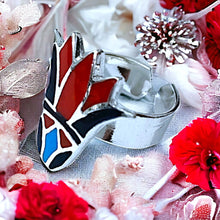
Crafted with elegance and meaning, the Lotus Flower adjustable silver ring embodies centuries of symbolism and craftsmanship. Inspired by the sacred flower's rich history in Eastern cultures, it represents purity, enlightenment, and rebirth. Its adjustable design ensures a perfect fit for any wearer, making it a timeless adornment for both aesthetic and spiritual journeys.
- History: Inspired by ancient cultures' reverence for the lotus flower symbol.
- Spiritually: Represents purity, enlightenment, and rebirth in various spiritual traditions.
- Talisman: Carries the essence of tranquility and spiritual growth.
- Handmade: Crafted with care, each ring holds unique energies and imperfections.
- Healing: Thought to promote emotional balance and inner peace.
- Material: Sterling silver, a metal associated with intuition and clarity.
- Symbolism: Lotus symbolizes beauty emerging from the depths, resilience, and enlightenment.
- How to Wear: Adjustable design fits any finger, wear it as a daily reminder of spiritual growth and beauty.
History Side For Those Who Are Interested
The Egyptian Lotus Flower holds a profound significance in the cultural, religious, and artistic realms of ancient Egypt. Renowned for its beauty, resilience, and symbolic depth, the Lotus has permeated Egyptian history since antiquity.
The Lotus (Nelumbo nucifera) is a aquatic plant native to Egypt, flourishing in the marshy regions along the Nile River. Its emergence from the depths of muddy waters, coupled with its resplendent blossoms that open each morning and close at night, captured the imagination of ancient Egyptians, inspiring a plethora of myths, rituals, and artistic representations.
In Egyptian mythology, the Lotus held a divine status, often associated with creation, rebirth, and the cycle of life. One of the most prevalent myths is the creation story of the cosmos from the primordial waters, where the Lotus flower emerged as a symbol of the birth of the sun god, Ra. The Lotus was believed to cradle Ra as he emerged from the chaotic waters, signifying the dawn of creation and the beginning of life.
Furthermore, the Lotus played a significant role in religious ceremonies and funerary rituals. Its association with rebirth and regeneration led to its depiction in tombs and temples, symbolizing the promise of eternal life in the afterworld. Priests adorned themselves with Lotus flowers during rituals, and the flower was often used as an offering to the gods, symbolizing purity and spiritual enlightenment.
Beyond its religious and symbolic significance, the Lotus also left an indelible mark on Egyptian art and architecture. Its elegant form was meticulously depicted in paintings, sculptures, and decorative motifs, adorning temple walls, sarcophagi, and ceremonial objects. The Lotus motif became a ubiquitous symbol of beauty, grace, and divine inspiration, reflecting the harmony between humanity and the natural world.
The influence of the Lotus extended beyond the confines of ancient Egypt, permeating various aspects of Mediterranean and Near Eastern cultures through trade and cultural exchange. The reverence for the Lotus endured through the centuries, influencing the artistic traditions of subsequent civilizations, including Greek, Roman, and Islamic cultures.
Today, the legacy of the Egyptian Lotus Flower endures as a timeless symbol of beauty, spirituality, and cultural heritage. Its significance transcends time and borders, continuing to inspire awe and fascination as a testament to the enduring power of ancient Egyptian civilization.









